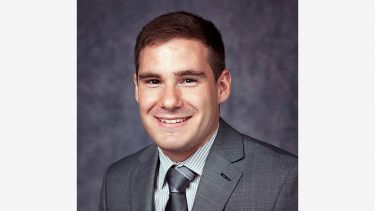'The particularly useful aspects of the year were the practical tutorials and amount of contact time'

You are a Forensic Electrical Engineer at Burgoynes. How did you secure this role and are you enjoying it?
I saw the role advertised on the IET Engineering and Technology careers website and it grabbed my attention and sounded like a really interesting career. I have been with Burgoynes for approximately 18 months and I haven’t looked back!
What does your day-to-day involve?
My role is predominately a fire investigator, conducting investigations into fires, explosions, and electrical failures.
My day-to-day tasks are a mix of conducting scene inspections, undertaking laboratory examinations, and producing written reports.
What was the reason why you decided to study a Foundation Year in Electrical Engineering at Sheffield?
For some time, I had been interested in pursuing a career as an engineer but I had not studied maths at A-level, which was required for a career in engineering. I therefore decided to study the Foundation Year at the University of Sheffield in order to develop the necessary skills to progress onto the Electrical Engineering Degree.
The course provides an excellent foundation for the degree course itself, allowing me to develop the required skills and knowledge.
It’s important to make an educated decision before deciding on the course and University you wish to study - visit the University and ask all the questions you have.
The setting and environment is hugely important when you will be spending 4+ years at the university. Make sure the foundation year offers what you need to successfully progress to the desired degree course.
What elements of the Foundation Year teaching did you find most useful during your degree?
The foundation year provided a good mixture of topics, covering Maths, Physics, and Chemistry to A-Level standard. The particularly useful aspects of the Foundation Year were the “practical” tutorials and the amount of contact time available, should you have ever needed support.
There were many people from many different backgrounds with varying amounts of experience and knowledge.
Christopher Thomas
Forensic Electrical Engineer
Aside from the teaching, what other elements of support/teaching did you find useful?
The lecturers were always willing to assist with questions and queries relating to the topics that had been taught during lectures. There were regular tutorials where taught subjects could be applied and there were numerous practical laboratory sessions, which complimented teachings.
The support from peers was also invaluable - there were many people from many different backgrounds with varying amounts of experience and knowledge.
In 2014, you graduated with a first in MEng in Electrical Engineering – that’s fantastic! What was your approach to studying - I'm sure students would like to know!
I don’t think there is a “one-size-fits-all” approach to studying. It very much depends on the individual but I would say that it’s important to recognise when a particular approach does not necessarily produce the desired results.
It is a big step from A-level to Degree, and possibly a big jump for those joining the Foundation Year who have not studied for some time.
Throughout the Foundation Year and my degree course, I tried several methods of studying/revising until I found the one that delivered. It’s also very important to remember to take time away from studying to give yourself time to recuperate.
Any societies you were involved in at Uni? Or any recent work accomplishments/awards?
Throughout my time at the university, I played ice hockey with the Sheffield Bears – joining a sports team/society is a great way to meet new people and it gives you the “change of scenery” that’s required when you are studying for a lot of your time.
Since completing my degree, I have become an Incorporated Engineer with the Institute of Engineering and Technology and I am currently working towards becoming a Chartered Engineer.
Finally, as a Sheffield graduate doing well in the industry, what are your top career tips?
Get as much experience as possible in various roles during the early years of the degree (e.g. voluntary work, work experience, summer placements, etc). Electrical engineering, and engineering in general, is vast and it's important to have a general idea of where you want to be at the end of the degree.
It's much easier to change roles once you have a bit of experience, including any experience gained whilst studying.

